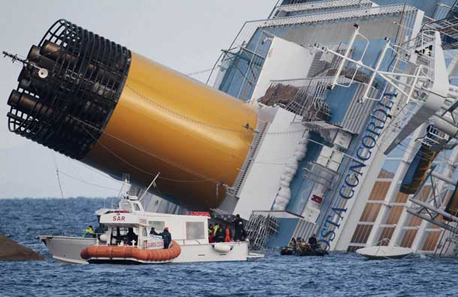|
As the confirmed death toll from the Costa Concordia tragedy reaches 15,
and salvage experts begin the task of safely removing 2,400 tons of fuel
oil from the ship, it's time to start looking for some answers from
Costa and the cruise industry as a whole. Seemingly shocked by the scale
of the disaster and the recklessness of Captain Schettino, they appear
to have spent the past week avoiding some serious issues rather than
confronting them.
Where, for example, is Micky Arison, Chief Executive of the Carnival
Corporation which owns Costa Crociere? With a personal fortune estimated
at $5.9 billion (£3.8 billion) he is ranked the 169th richest person in
the world by Forbes magazine, and is a recent convert to Twitter, where
he would boast in equal measure about Carnival and his other great love,
the Miami Heat basketball team which he also owns.
But a week ago he tweeted: "I won't be as active on Twitter for the next
while. Helping our @costacruises team manage this crisis is my priority
right now." After announcing a "comprehensive review" of all safety and
emergency response procedures across its nine cruise lines and 101 ships
he has been silent.
Costa themselves have employed Clarence Mitchell, the communications
expert best known for representing Kate and Gerry McCann during the
media storm which followed the disappearance of their daughter
Madeleine.
His role so far has been largely to brief against Schettino in order to
convince the world of the captain's reckless actions and divert scrutiny
away from the behaviour of the company and the safety of other ships -
Costa Serena, Costa Pacifica, Costa Favolosa and Carnival Splendor -
which are built to the same basic design as Concordia.
Revelations that Friday January 13 was not the first time Concordia - or
indeed other Costa ships - had sailed dangerously close to the island of
Giglio may eventually undermine this strategy. And there are legitimate
questions as to whether there was an underlying lack of discipline in
the organisation which permitted, and possibly even encouraged,
Schettino's cavalier style of captaincy.
Splendor, incidentally, is the ship which was knocked out of action in
November 2010 by an engine room fire. The ship - christened in Dover by
Myleene Klass in 2008 - drifted off the west coast of Mexico for several
hours without power and had to be towed to safety in San Diego. The ship
was out of service for four months while repairs were carried out -
including the fitting of a new engine which had been destined for
Carnival Breeze, under construction in Trieste.
Imagine the relief at Costa Crociere and Carnival Corporation when it
became clear that Concordia's accident was not the result of a similar
failure.
There has been speculation that Concordia will be salvaged and returned
to service. Arison's statement to the stock exchange last week,
anticipating financial losses for Carnival approaching a billion
dollars, added that the vessel was "expected to be out of service for
the remainder of our fiscal year, if not longer."
Other reports suggesting passengers booked on future Concordia cruises
have been offered a 30 per cent discount, and that Costa neoRomantica,
currently undergoing a €90 million refit, will be drafted in from March
as a substitute for Concordia, do not reflect well on Costa's thinking.
I have yet to see any announcement about the planned launch of sister
ship Costa Fascinosa - another variation on the Concordia design -
scheduled to take place in May.
The UK's Passenger Shipping Association has concentrated on assuring
consumers that despite this one-off tragedy, cruising is still
intrinsically safe. Surveys of cruise specialist travel agents, showing
little or no reduction in booking inquiries over the past few days,
suggest that the strategy is succeeding.
But it would be surprising if holidaymakers who have yet to "choose to
cruise" do not pause for thought, and it may be that UK cruise lines in
particular will need to re-focus their marketing strategies on their
loyal regular cruisers, for the time being at least.
Because I was away in the Caribbean - cruising on Allure of the Seas - I
was unable to accept an invitation from "the global cruise industry" to
a media briefing in London with a panel of experts "covering the safety
regime for cruise ships."
To be honest, I doubt if I missed a great deal; the invitation went on
to state: "We will not be in a position . . . to comment or speculate on
the Costa Concordia incident."
Captain Bill Wright, senior vice-president of marine operations at Royal
Caribbean was there to defend modern cruise ship design, and to reassure
us that lessons would be learned from "the incident."
Almost as if in response, Siim Kallas, European Commissioner for
Transport, demanded that an on-going EU review of passenger ship safety
legislation should take account of Concordia - in particular the issues
of design and stability, emergency evacuation procedures, and crew
training.
Meanwhile, Royal Caribbean president Adam Goldstein is the only Carnival
competitor to have so far made a public statement, in which he describes
the Costa Concordia accident as "a defining moment in the history of the
modern cruise industry.
"We will need the results of the authorities' investigations to truly
understand and respond to all of the implications," he said in his blog.
"But we do not need to wait for anyone or anything to underscore the
pre-eminent role of safety in the daily life of every cruise ship and of
the industry as a whole."
So, there have been plenty of assurances about passenger safety being of
"paramount importance," and lots of questions about how and why the
grounding could have happened.
Now it's time to expect some answers. |



